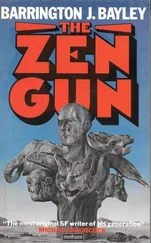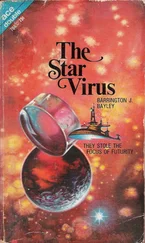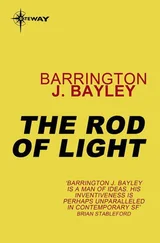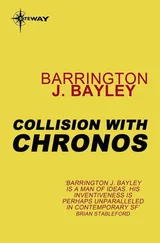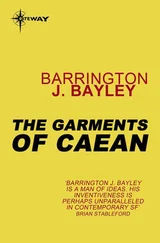“Look!” I said. “Do you see?”
He paused, and gazed at the screen. Ships were approaching, a whole fleet of them, riding forward as if on a cumbersome breeze. They were odd-looking affairs, composed of long curved beams, and through the wide gaps these afforded we could vaguely distinguish crews and crude apparatus. There were also signs of flurried activity in the vicinity of the nearby buildings.
The inhabitants were clearly prepared to defend their city. I noticed that some of the ships, larger than the others, had something mounted on their prows which looked strangely familiar, and as I watched, the foremost vessel swung into action.
“It’s a catapult!” Joule shouted.
Clang! The Interstice ’s galleries rang with the impact of the missile against her hull. Joule laughed. “Let them shoot away!” And he bent himself once again to the control console.
But it proved impossible to dislodge our ship, and eventually, with the subearthers’ missiles raining down on us, we resorted to our weapons. Though we used them sparingly, our torpedoes and seismo-beams caused terrible havoc before we had blown a pathway and could continue our journey. For fifty miles the fleet harried us, pounding the walls of the ship in an attempt at revenge.
“And this is at three hundred miles!” Captain Joule exclaimed. “What will we find further on?”
The possibilities were frightening. The Earth’s interior is much more spacious than its surface, and has room for a vaster variety of creatures. Here, we had come up against primitives. In the depths, might we find imposing civilisations of super-science, to whom the Interstice was a toy? Or there might be monsters in the Earth….
But discovery had become the prime object of the dive as far as I was concerned, and no danger could be allowed to stand in the way of scientific endeavour.
And the possibility of meeting enemies was not the only danger. By now, I knew that something else was seriously wrong.
I had been checking over the readings which the external instruments had given. By the laws of physics, it seemed inevitable that the figures for density and heat should have risen steadily as we descended. Inexplicably, they had remained the same since we began the dive at ten miles.
Captain Joule showed an engineer’s interest, but was unperturbed. “What about magnetism?” he asked.
“No change either,” I told him, “but then there wouldn’t be much at this depth: the gauss shunt is needed for later.”
Just the same, we both went along to inspect the shunt, starting at the meson charger in Power Section, and tracing one of the iron-silver channels along a narrow hull corridor to the stern. I studied the meters mounted on the insulated chamber which contained the bank. The needles should have moved slightly as a small increment of magnetic force was bled away to maintain surface normal. Instead, they were dead against the stops.
I picked up a phone and called Power Section. “Move the bleed bar two inches,” I ordered.
As the rheostat was manipulated, one dial stirred to show force being passed to ground, and another told of decreasing field strength in the ship.
Joule grunted. “Could anything be wrong with it?”
I ordered the rheostat to be returned to its original position. “No,” I said, “it’s in perfect order. Perhaps we just have to accept the fact that the interior of the Earth is different from what we have always assumed. Either that, or else we are in a pocket of low density. Anyway, our progress is good.”
But as the days passed, I kept constant check on the density, heat and magnetism readings, and always to find the same result. No change. I grew seriously worried.
I reminded myself that apart from the Interstice ’s intrinsic instruments we had no way of checking her actual velocity. To rectify this I designed a mass-meter, which, I reasoned, could tell our rate of progress by measuring first the mass of the Earth ahead of us, and then that part of the Earth we had put behind us.
The result startled me. The two readings taken together disagreed with the known mass of the Earth.
“That’s ridiculous!” I told Joule. “The Earth would have to weigh more than it did when we set out. And we’ve put five hundred miles behind us, but the distance ahead is still the same.”
Were we moving, or weren’t we?
It was an enigma. Pointed one way, the mass-meter indicated that we were. Pointed the other way, it indicated that we were at a standstill.
I waited a further week, during which the puzzle enlarged itself. By this time we should have reached a depth of one thousand miles, and be learning the extent of our ability to survive under extreme pressure. In fact, we had clocked a thousand vertical miles; but our approach to the core had still not advanced. We seemed to be advancing along the line of a paradox, where no matter how fast we run, the finishing line never comes nearer.
The knowledge of it was both frustrating and depressing. It was now no longer possible to treat it as an intellectual puzzle.
We had found no more cities, and no further attacks had been made on us, but we took care not to repeat our previous mistake. The scanners operated continuously, and showed various dim flickers of polarisation in the distance. I spent hours gazing at the screen. Occasionally, a vast shape drifted by on the edge of scanner range, and transient forms whose nature we could not guess appeared.
After thirteen days of travel, Captain Joule called the officers to his cabin.
Impassively, he faced them in his bucket seat, and allowed them to fall quiet, cramped and sweating, before speaking.
“Gentlemen,” he said, “I wish to review our position. Ross will tell you the situation.”
Briefly, I explained about the mass-meter readings, and the uniformity of pressure we had found at all depths of the mantle. We were driving the ship into a discrepancy between instrument readings. The further we went, the greater the discrepancy became.
“Apart from common sense,” I finished, “there is nothing to indicate that we have gone one inch towards fulfilling our aim of reaching the Earth’s core.”
“Then are we at a standstill?”
“From one angle, it looks like it,” I conceded, “but I don’t think so. We are still expending energy. The propulsors are working perfectly, and this can only result in motion. We must be going somewhere, and in fact you only have to look at the detector screens to see that we are actually in motion.”
“And getting nowhere,” Joule put in. “As far as the Navy is concerned, the purpose of this dive is to get back to base, which we do not seem to be achieving.”
“Are you suggesting that we turn back?”
“It has been in my mind. There may be no obstacle in our way now.”
My heart sank at the words. Our discoveries had intrigued me enough to want desperately to continue, and the danger, and the strangeness we had encountered, only gave me an overpowering urge to journey further.
I knew Captain Joule secretly agreed with my attitude, for he is one of the best of men, the finest of officers. There are some who find blame with our generation, saying that it has become ultraconservative and rigid; but I claim that this is no fault, only an inevitable era of civilisation. The spirit of our nation was never stronger than it is now. We are producing great men, fabulous engineers. Captain Joule knew the tacit dictum of our engineers—never to know fear, never to draw back—but he had a duty to his command, which I, though it saddens me now to confess it, did not feel.
“Why turn back?” I asked intensely. “We must carry on! The puzzle will resolve itself—and anything we encounter in the Earth, we will deal with!”
Читать дальше




